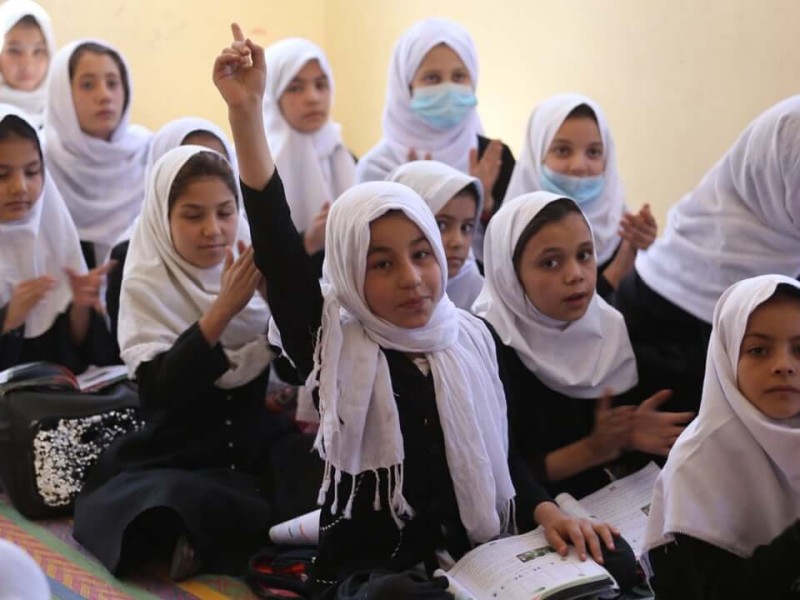Organising the resistance - youth activism mobilises for the right to education in Afghanistan

"If the Taliban forbid girls' access to schools, I will teach on Facebook. If they limit studies, I will upload the books to the Internet. If they cut the Internet, I will send books by mail. I will not give up," said Afghan activist Pashtana Durrani in a video that has gone viral on Twitter.
With the same determination that Pashtana Durrani shows and on the occasion of the World Day to Protect Education from Attacks, the young activist of the Global Campaign for Education (GCE) wants to express their solidarity with the Afghan people, especially with women, girls, and men, in the current context of insecurity, terror and repression.
The violation of fundamental rights in Afghanistan, including the right to education, is not new. Instability, fighting between different armed factions, and attacks by both the Taliban and the "Islamic State of Khorasan Province" have claimed many civilian victims, especially among the youngest. According to United Nations data, in 2019 alone, there were 3,403 civilian victims, of which 30% were boys and girls. Education has long been at the center of the bulls-eye, too: between 2017 and 2019, more than 300 attacks on schools were recorded in Afghanistan, in which at least 410 people were killed or injured, including students, teachers, and educational personnel. Also, the right to education of girls and women was especially vulnerable before the arrival of the Taliban; According to UNICEF data, in 2018, 60% of Afghan children who were out of school were girls.
However, we fear that this fragile situation will worsen over the years. Since the fall of Kabul on 14 August 2021, we have witnessed the mass evacuation of tens of thousands of people, as the security situation continues to deteriorate, as evidenced by the attack at the Kabul airport on 26 August 2021 in which hundreds of people were killed. This atrocity, claimed by the Islamic State of Khorasan (declared enemy of the Taliban), is just a sample of the chaos that is looming in Afghanistan, which will continue to be the target of this type of terrorist attack.
This is in addition to the Taliban's terrible record on human rights, especially of women and girls. As young activists for the GCE, advocating for the right to education, we want to express our enormous concern about the impact that the seizure of power by the Taliban will have on the rights of women, especially concerning the right to education. Although they are trying to sell a more moderate image than twenty years ago, we have not been slow to see samples to the contrary, for example, with the images of the separation between men and women in Afghan universities this week. All of this reinforces our conviction that reality is and will continue to be very different from how the Taliban regime wants to paint it. We have no doubt that, as has happened in the past, the Taliban's public policies will have enormously damaging consequences for girls and adolescents and the entire education community and the right to education in Afghanistan.
What is happening in Afghanistan is overwhelming. Although the contexts of politics and social conflict is affecting us in different ways, we know that violence and discrimination are never part of the solution; education is. Afghan girls and young women must have access to education. They have to have it; it is their fundamental human right. For this reason, we want to ask young people around the world, as they have done many times throughout history, to demonstrate their commitment to causes that, like this one, affect both youth and humanity as a whole. The current crisis in Afghanistan requires urgent and coordinated measures from both institutions and society. We encourage young people to put pressure on their governments to put measures to improve the situation, especially for women and girls. We urge the youth to share information on their networks that contributes to raising awareness of what is at stake in this crisis; to participate in protest demonstrations, and support initiatives to host Afghan refugees. Our brothers, especially our Afghan sisters, have tirelessly demanded their rights and freedoms for years and are an example of strength and perseverance. We must stand by their side, organising resistance and demonstrating that collective action is essential to achieve change.
Make no mistake: millions of Afghan girls and adolescents risk being totally deprived of their right to education. The world cannot remain silent and unmoved by this threat. Of course, the young activists of the GCE will not do it.
Rantia Sabbah, youth coordinator for the Global Campaign for Education in the Arab region.
Jazmin Elena, spokesperson for the Student Movement of Latin America and the Caribbean (MELAC)
Carmen Romero, member of the Steering Committee of the Global Student Forum


